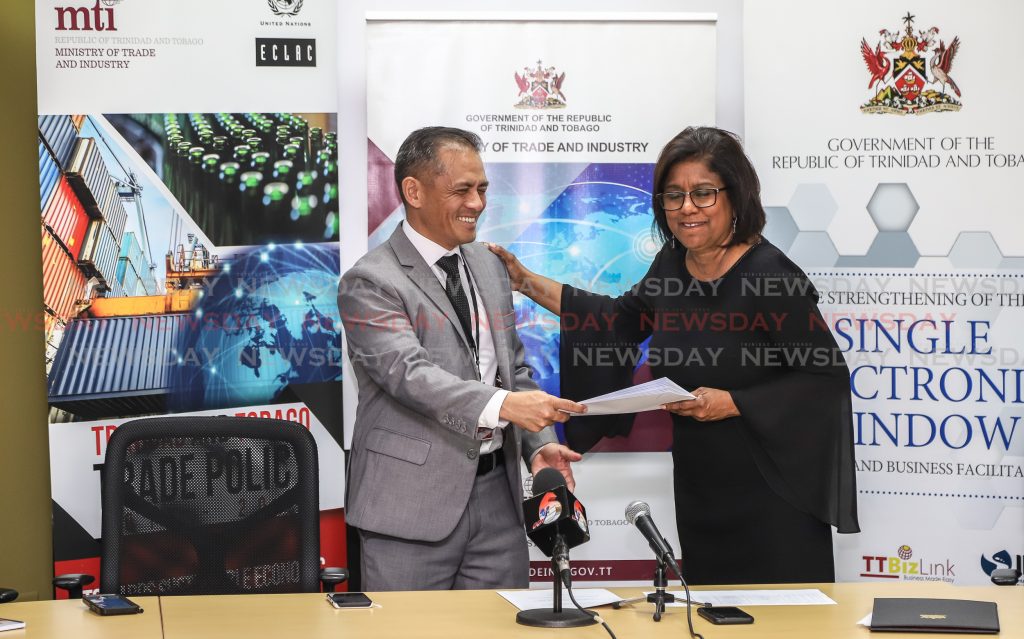'TT will be better in 2020'

TT will be in a better position by 2020 with the implementation of institutional, legislative, administrative and policy reforms.
Trade and Industry Minister Paula Gopee-Scoon outlined the ministry’s efforts over the last four years to enhance trade performance and business facilitation environment, during a press conference on Friday at Nicholas Tower, Port of Spain.
Gopee-Scoon said the public will soon benefit from being able to make Linx and credit card online payments for government services. The treasury is currently testing e-payments to develop a framework of guidelines to draft an Electronic Transfer Act.
“This e-payments initiative supports the ministry’s e-commerce strategy, which has the principal objective to create an enabling environment that facilitates and promotes e-commerce for local businesses to serve the domestic and international markets," she said.
The ministry is seeking a consultant to strengthen TTBizlink software’s security for all users. This project will begin in 2020.
Bizlink holds sensitive data for over 4,000 companies and over 7,000 individuals via electronic services on behalf of 24 government agencies. This move will also reduce software maintenance costs by 50 per cent.
Towards the enhancement of TTBizLink, the Inter-American Development Bank (IDB) will invest $25 million to strengthen the Single Electronic Window (SEW) for trade and business facilitation programme. This programme began in April and will be implemented over five years.
Gopee-Scoon said the ministry is targeting the World Bank, through consultants in the SEW programme, to make doing business in TT easier.
She agreed TT’s Doing Business ranking has dropped, but said the ministry doesn’t have an implementation problem to stabilise the country’s global business rank.
“TT is a much more complex business and trading environment; it has been so for decades," she said, but through SEW the country has enhanced many of its e-services.
“But it requires more: deep analysis and recommendations going back to all of our trade ordinances, and perhaps we have gone too deep.”
TT is ranked 125th out of 190 countries in the Doing Business 2019 ranking. Gopee-Scoon said she is not pleased with TT’s rank and is working with the private sector and government agencies to improve it.
She said the ministry had identified institutional, policy and legislative reforms gaps in 2017, through a multi-logistics gap analysis.
The focus, to close all gaps, will be to “implement an integrated risk management system, expedite clearance decisions by border agencies, eliminate redundant steps for approving import/export permits, implement transparent, published standard operating procedures within the main border agencies and to provide e-payments to reduce encourage e-payments.”
She gave details of other projects that have been completed or are under way.
The Central Statistic Office website has been reviewed and upgraded and in December there will be a new system to manage data. This project was completed in July with a $25,000 budget.
In November there will be a system, developed by Crimson Logic Ltd, of Singapore, to reduce time and cost of applying for a construction permit. In December, all Town and Country Planning Division records will be digitised.
The Trade license Licence Unit, under the trade ministry – responsible for administering the import and export of goods in TT– had already digitised 80,000 records and there are plans, by the ministry to develop an electronic collateral registry system.
Government is also working on implementing a port community system (PCS) to offer several logistical services, including shipping instructions, road transport services, port call management, and dangerous goods management.
The ministry is also working with the Customs and Excise Division to reduce the time for border compliance for importers and exporters and to improve the accuracy and targeting of high-risk cargo. This will improve the processes for trading across borders, Gopee-Scoon said.
Over the past year, container scanners were installed in the ports of Port of Spain and Point Lisas. These will reduce the time and cost of moving containers in and out of the ports and reduce the trade in illegal goods.
Development and implementation of a change management strategy, a 48-month project, is happening and will be completed in mid-2020 to enhance government online services, as well as reducing the time frame for processing individual work permit applications and exemptions.


Comments
"‘TT will be better in 2020’"